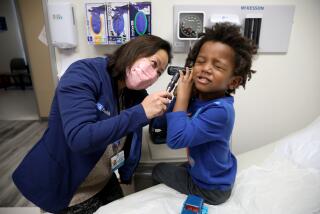Newborns Will Be Screened for More Diseases
- Share via
California families will soon be able to have their newborns tested for up to 30 rare metabolic disorders, a screening that, in some cases, may make the difference between normal development and death.
Beginning Jan. 7, the state’s Newborn Screening Program, which already tests for four inherited conditions, will be expanded to include 20 to 30 others. Most hospitals with maternity wards will offer the testing, part of a pilot project designed to gather information on the incidence of the conditions, says Dr. George Cunningham of the state’s Department of Health Services.
Although some questions remain about the impact on children whose disorders can’t be treated, leading health officials praised the announcement of the project earlier this month. California now joins a handful of other states that have added the tests, which use sophisticated technology called tandem mass spectrometry, to their newborn screening programs.
“When you put 20 rare diseases together, it will be a significant number picked up by TMS, especially in a big state like California with a high birth rate,” said Dr. Edward McCabe, physician-in-chief of Mattel Children’s Hospital at UCLA and an authority on newborn screening. Health officials aren’t certain exactly how many of the rare disorders they will be able to reliably detect with the new technology but expect that at least 20 will be diagnosable.
For perhaps several dozen families a year in California, the expanded screening will mean having a developmentally normal child instead of one who dies in infancy or has lifelong health problems, said Dr. Andrea Kachuck, a pediatrician volunteer with the Southern California chapter of the March of Dimes. The organization has long lobbied for additional testing of newborns.
“I think this is an extremely positive development,” said Kachuck. “With these new [disorders] being added, it’s an opportunity to catch these babies before damage is done.”
Babies with metabolic disorders, caused by a defective gene, lack one of many enzymes that are crucial for converting food into energy. When metabolism goes awry, toxic chemicals can build up in the body causing serious health problems or death. If diagnosed early enough and treated with a special diet or other measures, permanent damage may sometimes be averted.
Since the 1960s, newborn screening for inherited health problems that aren’t readily apparent has stood as one of the triumphs of the modern public health era. The first test was for phenylketonuria, or PKU, a disorder that is treated by diet but causes mental retardation if untreated.
However, progress in expanding screening has been slow. California tests newborns for only four disorders: PKU, galactosemia, congenital hypothyroidism and sickle cell disease. In the test for those problems, a blood sample is taken from newborns before discharge from the hospital and sent to a lab for screening. The blood drawn for that procedure will now be sent to a special lab, where the state has installed the new machines.
The state has begun mailing 18,000 patient education brochures to doctors and hospitals to inform Californians of the expanded screening, which parents must request. Hospitals are not required to offer expanded testing, but most of those with maternity units are expected to do so.
“We don’t know what the participation rate will be [among patients]. But we think most parents, offered supplemental testing at no additional cost, will take advantage of the offer,” Cunningham said.
Newborn screening, which is typically covered by insurance, costs $42, although the basic cost is expected to rise in 2002. The state will pay for the additional tests.
Under the state’s current newborn screening program, about 360 babies a year are diagnosed within days of birth and begin life-saving treatment.
The additional tests are expected to identify about 80 babies a year (about one in 6,000), Cunningham projects, although other studies show the detection rate may be closer to one in 4,000. California has about 500,000 live births a year.
The disorders being added to the screening are rare but no less devastating to families. For example, with MCAD deficiency, infants lack an enzyme required to convert fat to energy. As a result, they can have seizures, lapse into comas and die. Such infants often look healthy at birth because the mother’s metabolic system compensates for the infant’s defective system in utero.
“By detecting MCAD in the newborn and alerting the doctor and family, we can put the baby on a diet which ensures they have adequate carbohydrate intake,” Cunningham said.
Another disorder that may be found under the expanded screening is maple syrup urine disease, so named because the urine smells like maple syrup. The disorder, which is more common among Latinos, was considered fatal in the 1950s, says Dr. Edwin Naylor, a veteran of TMS testing and founder of a private testing lab, Neo Gen Screening in Bridgeville, Penn. By the late ‘60s, babies usually survived, but with permanent damage.
“Now we have much quicker screening tests and, by day five, can plug these kids into treatment centers as basically healthy newborns and regulate their diet,” Naylor said. “The outcomes are much, much better. These are pretty much normal kids.”
Without screening for these rare metabolic disorders, however, many infants die of unexplained causes, Cunningham said. One study found, for example, that some deaths of children under age 2 were actually MCAD-related deaths, he said. Dr. Richard Koch, an expert in PKU at Childrens Hospital of Los Angeles, said that up to 5% of sudden infant death syndrome cases may be due to metabolic disorders.
Tandem mass spectrometry uses high energy to break apart molecules and weigh the pieces on an atomic scale. This allows for identification of particular molecules in a patient’s blood--enzymes, fatty acid components and organic acid components--that can be defective.
The technology will also allow for improved accuracy of PKU testing, McCabe says. By using TMS, which costs $350,000 per machine, fewer babies will receive false positive or false negative test results.
However, TMS newborn screening departs from conventional newborn screening in one important regard, experts note. Not all of the identified disorders can be treated.
“There is controversy in that some people feel you should not screen for a disorder you can’t treat,” says Koch. But, he adds, the information can still be useful to families. For example, a couple may choose to avoid having more children after having one child diagnosed with an inherited disorder.
The state opted to proceed with the expanded screening because of the potential for treatments to emerge, Cunningham says.
“Until we start identifying these cases and give doctors an opportunity to intervene early, we won’t have treatments,” he says.
For example, in the 1950s, childhood cancers were often diagnosed though there were few ideas about how to help such patients, McCabe says.
“Now we’re seeing 80% to 85% cure rates for many childhood cancers,” he says. “We need to take these kids with rare metabolic diseases and begin to look for treatments. Certainly it is better to diagnose the child when the child [appears] well.”
*
What the Tests Aim to Detect
In California, newborns are currently screened for four inherited disorders that can cause serious health problems if they are not detected and treated promptly.
Beginning in January, however, the state will use new technology to screen for 20 to 30 rare metabolic disorders as well.
Disorders screened for now:
Phenylketonuria (PKU): Inability to process amino acid phenylalanine, which can accumulate and damage the brain; affects one in 12,000 newborns; treated with low-phenylalanine diet through childhood and occasionally during adulthood.
Galactosemia: Deficiency of liver enzyme needed to convert galactose into glucose; can lead to organ damage, blindness, mental retardation and death; affects one in 50,000 newborns; treated by cutting milk and dairy products from diet.
Congenital hypothyroidism: Thyroid hormone deficiency that retards growth and brain development; affects one in 4,000 newborns; treated with oral doses of thyroid hormone.
Sickle cell disease: Blood disease that causes severe pain, damage to organs, stroke and sometimes death; affects one in 400 African American newborns; is less common in other ethnic groups; requires medical supervision and penicillin.
Some disorders that will be added to screening next year:
MCAD deficiency: Lack of an enzyme required to convert fat to energy; affects one in 15,000 newborns; requires steady glucose intake and avoidance of fasting.
Maple syrup urine disease: Error of metabolism; affects one in 250,000 newborns; treated with special diet.
Homocystinuria: Deficiency of enzyme responsible for converting amino acid homocysteine into cystathionine, which is needed for brain development; affects one in 275,000 newborns; requires special diet and high doses of vitamin B-6 or B-12.
More to Read
Sign up for Essential California
The most important California stories and recommendations in your inbox every morning.
You may occasionally receive promotional content from the Los Angeles Times.










